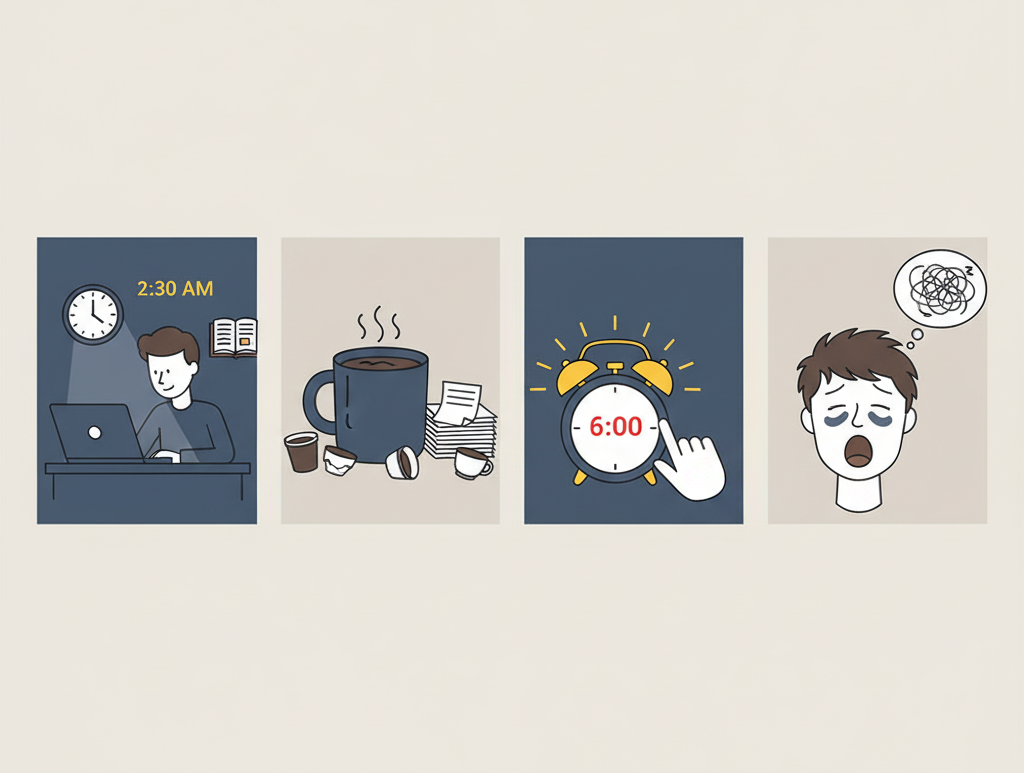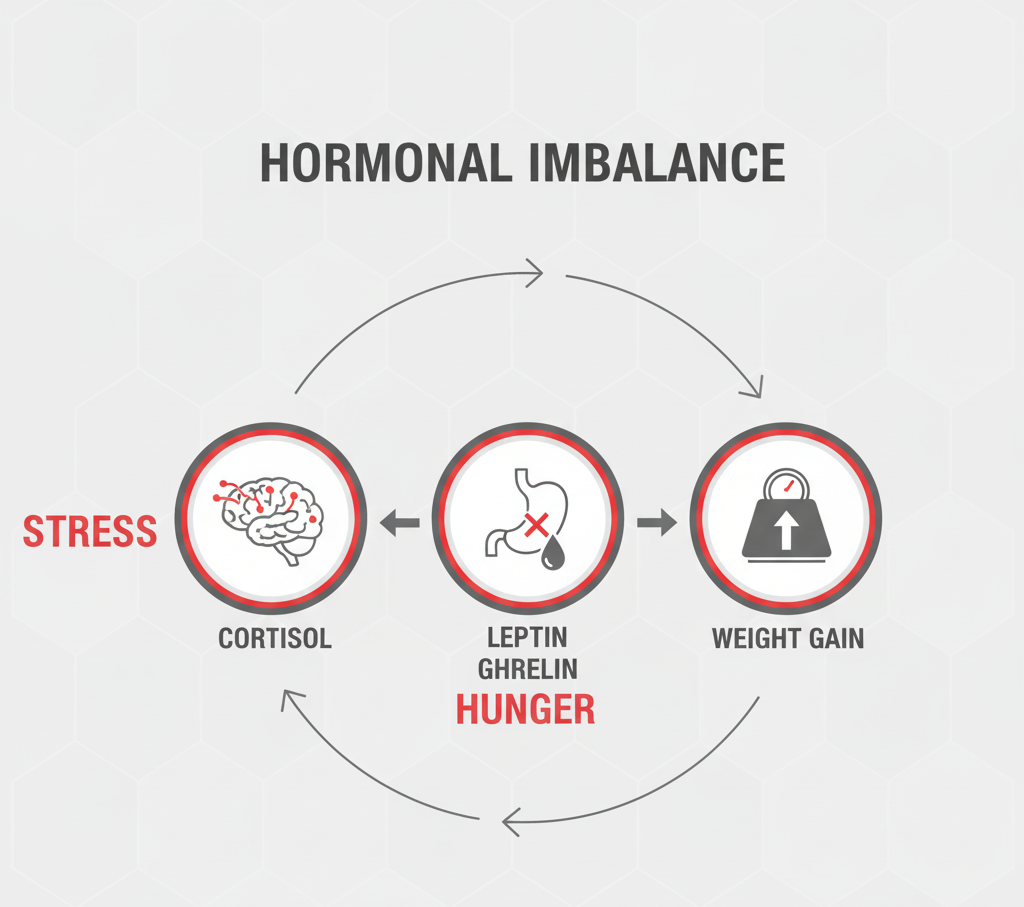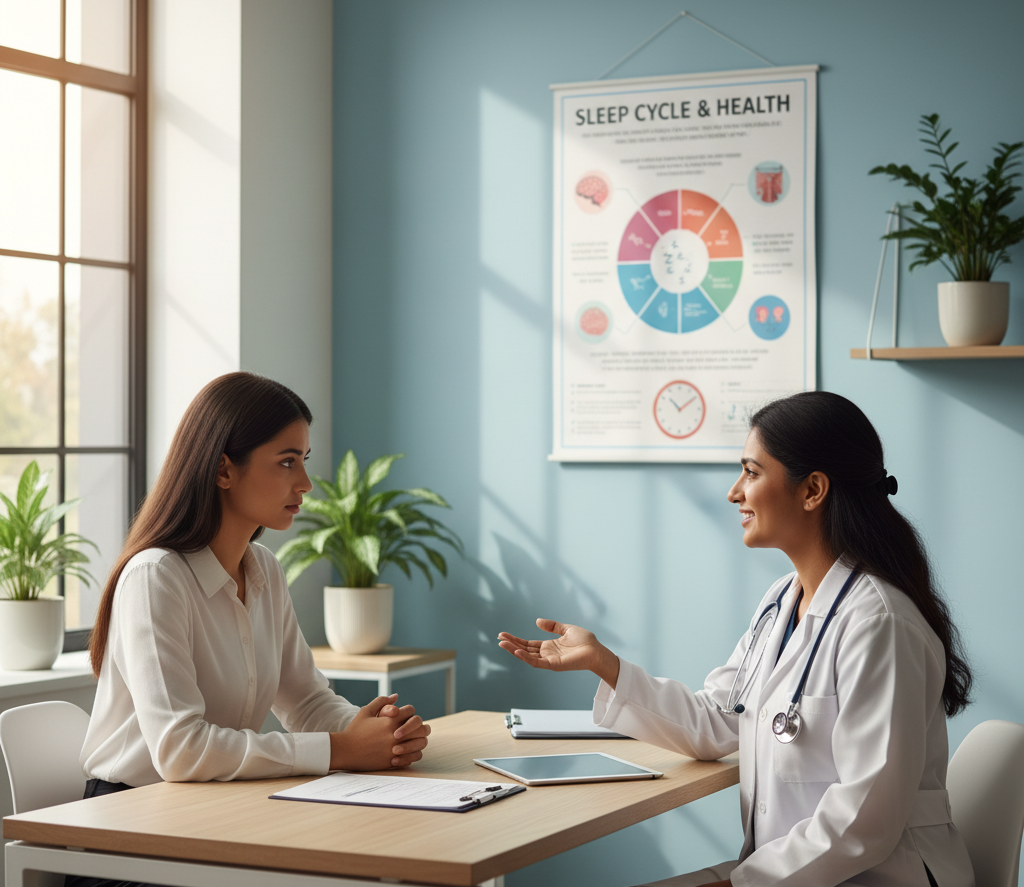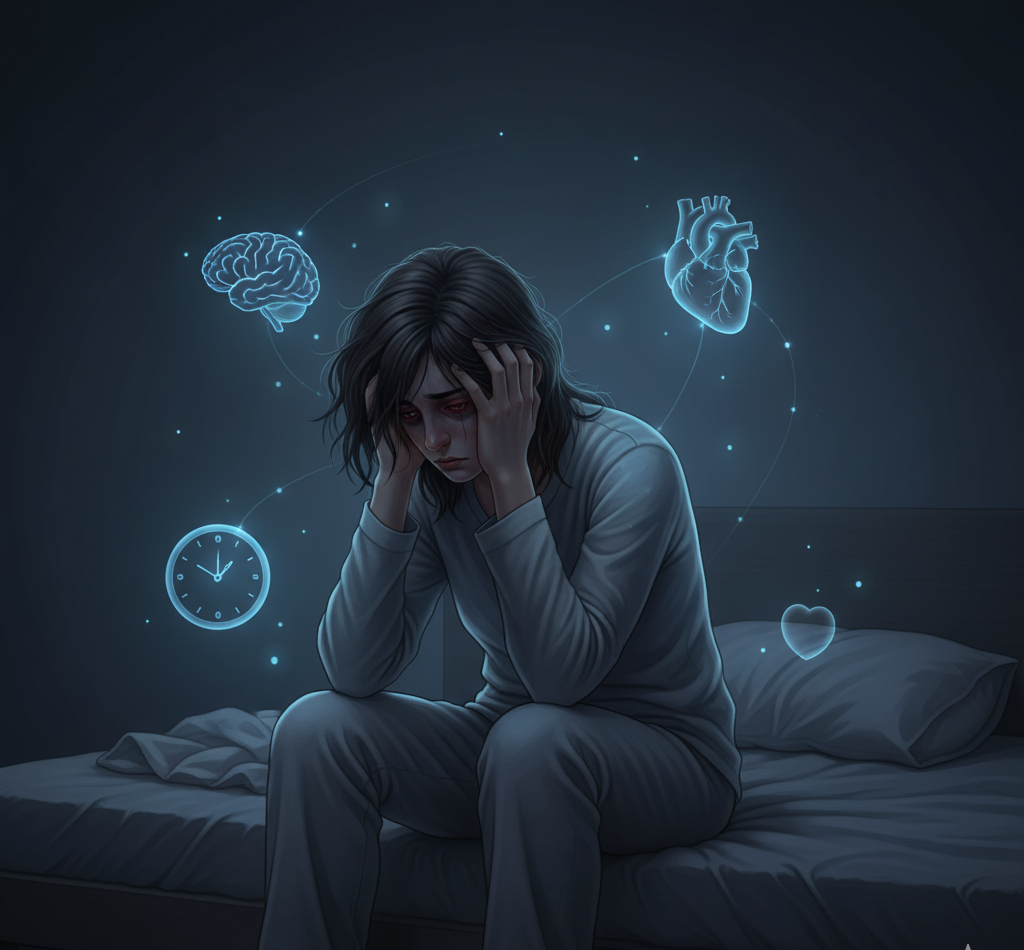Introduction
Everyone has the occasional bad night — tossing, turning, and counting sheep. But when sleep deprivation becomes a regular pattern, it can silently harm nearly every system in your body. From mood swings and memory loss to weight gain and weakened immunity, poor sleep does far more than make you tired.
In India’s fast-paced, digital lifestyle, sleep often takes a backseat. Yet, doctors warn that skipping rest is as risky as skipping meals or exercise. Let’s explore why even one bad night’s sleep can disrupt your lifestyle health, and how to restore your natural rhythm.
1. What Is Sleep Deprivation?
Sleep deprivation means getting less sleep than your body needs to function properly.
Most adults require 7–9 hours of quality sleep each night.
When you sleep poorly or too little, your body misses out on vital repair processes that happen during deep and REM sleep.
Common causes include:
-
Late-night screen use
-
Work stress or irregular hours
-
Caffeine or alcohol before bed
-
Sleep disorders like insomnia or sleep apnea
Even a single restless night can affect your attention, mood, and metabolism the next day.

2. How Sleep Deprivation Affects the Brain
Your brain is the first to suffer when you don’t sleep well. During sleep, the brain clears toxins, consolidates memories, and restores focus. Without it, you may notice:
-
Brain fog and reduced concentration
-
Short-term memory lapses
-
Irritability and anxiety
-
Slower reaction times
-
Poor decision-making
Long-term sleep loss increases the risk of depression, dementia, and cognitive decline. Scientists even call sleep “overnight therapy for your brain.”
3. The Impact on Heart and Metabolic Health
A sleepless night raises blood pressure, stress hormones (cortisol), and inflammation, all of which stress your heart.
Studies show chronic sleep deprivation can lead to:
-
Heart disease and stroke
-
High blood pressure
-
Type 2 diabetes
-
Weight gain and obesity
Lack of rest disrupts insulin regulation and increases cravings for high-sugar, high-fat foods — explaining the “midnight snack syndrome.”
4. Sleep and the Immune System
During deep sleep, your body releases cytokines — proteins that fight infection and stress.
If you cut your sleep short, your immune system weakens, making you prone to:
-
Frequent colds or flu
-
Slower wound healing
-
Increased inflammation
In short, good sleep is nature’s most affordable immunity booster.
5. Sleep Deprivation and Hormonal Imbalance
Your hormones depend heavily on your sleep cycle.
When you don’t sleep:
-
Leptin (fullness hormone) drops
-
Ghrelin (hunger hormone) rises
-
Cortisol spikes, causing stress
-
Melatonin decreases, disrupting body clock
This imbalance leads to overeating, fatigue, and stress-related weight gain, even if your diet hasn’t changed.

6. Emotional and Mental Health Effects
Sleep and emotions are deeply connected. Just one night of poor rest can make you:
-
Easily irritated or anxious
-
Overly emotional
-
Less empathetic
-
Prone to mood swings
Over time, chronic insomnia can contribute to depression, burnout, and anxiety disorders.
7. Lifestyle Health: How Modern Habits Ruin Sleep
In India, late-night scrolling and work-from-home routines have increased sleep deprivation dramatically. Common lifestyle disruptors include:
-
Screen time before bed (blue light reduces melatonin)
-
Caffeine late in the evening
-
Irregular sleep schedules
-
Skipping meals or overeating at night
-
High stress from urban life
Your body clock thrives on rhythm — consistent sleep and wake times are key to lifestyle health.
8. One Bad Night: The Hidden Chain Reaction
Even a single sleepless night triggers:
-
Drop in focus by 30–40%
-
Reduced glucose tolerance (linked to diabetes)
-
Higher cortisol and stress levels
-
Decreased immune response for 24 hours
-
Heightened risk of accidents or poor judgment
So yes — one bad night can do more harm than you think.
9. How to Fix Your Sleep: Practical Tips
-
Follow a sleep schedule — same bedtime every night.
-
Avoid caffeine after 4 PM.
-
Unplug screens 1 hour before bed.
-
Create a cool, dark, quiet room.
-
Exercise regularly, but not right before bedtime.
-
Limit naps to under 30 minutes.
-
Try relaxation techniques like meditation or slow breathing.
-
Avoid heavy meals and alcohol at night.
Even small changes can restore your body’s natural sleep rhythm within weeks.
ALSO READ: 7 Teas To Help Lower Your Blood Pressure Naturally
10. When to See a Doctor
Consult a doctor if you:
-
Can’t sleep for 3 or more nights a week
-
Snore loudly or gasp during sleep
-
Wake up tired even after 8 hours
-
Rely on sleeping pills regularly
-
Feel anxious or depressed due to poor sleep
Through Quickobook, you can easily connect with sleep specialists, psychiatrists, or general physicians who help identify root causes and design personalized solutions.

11. The Long-Term Risks of Sleep Deprivation
Ignoring poor sleep can lead to:
-
Obesity and diabetes
-
Hypertension and heart failure
-
Mood disorders
-
Memory decline
-
Weakened immunity
-
Lower life expectancy
Sleep isn’t a luxury — it’s a vital part of your lifestyle health and longevity.
Conclusion
Your body is like a phone — without recharging, it can’t function well.
Sleep deprivation drains your energy, health, and happiness one night at a time.
But the solution is simple: prioritize sleep as seriously as diet or exercise.
When you give your body rest, it gives you back focus, strength, and peace.
50 Frequently Asked Questions
Q1. How much sleep do adults need daily?
A. 7–9 hours for most healthy adults.
Q2. Is one night of bad sleep harmful?
A. Yes, it affects mood, focus, and metabolism even after one night.
Q3. What happens if I don’t sleep for 24 hours?
A. You may experience confusion, irritability, and slowed reaction time.
Q4. Can lack of sleep cause weight gain?
A. Yes, it alters hunger hormones and increases cravings.
Q5. Does sleep deprivation affect the heart?
A. Long-term poor sleep raises blood pressure and heart disease risk.
Q6. Can I recover by sleeping longer the next day?
A. Partial recovery is possible but not fully restorative.
Q7. What is REM sleep?
A. The deep sleep stage when dreams occur and brain repairs itself.
Q8. How does sleep affect immunity?
A. It strengthens your immune defense and reduces inflammation.
Q9. Does drinking coffee reduce sleep quality?
A. Yes, caffeine stays in your system for 6–8 hours.
Q10. What is “sleep hygiene”?
A. Healthy habits that promote better sleep, like consistent routines.
Q11. Are sleeping pills safe long-term?
A. No, they should be used short-term under medical guidance.
Q12. Does stress cause insomnia?
A. Yes, it’s one of the most common triggers of sleeplessness.
Q13. Can meditation help sleep?
A. Absolutely, it calms the nervous system.
Q14. What are signs of chronic sleep deprivation?
A. Constant fatigue, poor focus, low immunity, and irritability.
Q15. Does sleeping late but 8 hours count?
A. Quality and timing both matter; aim for early-night rest.
Q16. Can lack of sleep affect skin health?
A. Yes, it causes dullness, dark circles, and early aging.
Q17. Can poor sleep increase diabetes risk?
A. Yes, it reduces insulin sensitivity.
Q18. How to manage insomnia naturally?
A. Follow a sleep routine, avoid screens, and limit caffeine.
Q19. Can napping replace night sleep?
A. No, naps can’t substitute full-night rest.
Q20. Is sleep deprivation linked to depression?
A. Yes, lack of sleep worsens mood and anxiety.
Q21. Can exercise improve sleep?
A. Regular physical activity enhances sleep quality.
Q22. What is the best time to sleep?
A. Between 10 PM–6 AM for most people.
Q23. Can smartphones cause insomnia?
A. Yes, blue light suppresses melatonin.
Q24. How does alcohol affect sleep?
A. It disrupts REM sleep and causes restlessness.
Q25. Does reading before bed help?
A. Yes, if it’s relaxing and screen-free.
Q26. Can herbal teas improve sleep?
A. Chamomile and lavender tea can promote relaxation.
Q27. What is circadian rhythm?
A. Your body’s internal 24-hour biological clock.
Q28. Can sleep deprivation affect students?
A. Yes, it lowers grades and concentration.
Q29. How long does it take to recover from poor sleep?
A. Usually a few nights of consistent rest.
Q30. What foods help sleep?
A. Bananas, almonds, warm milk, and whole grains.
Q31. Can sleep affect fertility?
A. Yes, poor sleep can disrupt reproductive hormones.
Q32. Is it bad to eat right before bed?
A. Yes, it can cause indigestion and poor sleep.
Q33. How can parents help children sleep better?
A. Maintain bedtime routines and reduce screen exposure.
Q34. Can yoga help with insomnia?
A. Yes, poses like Shavasana and deep breathing calm the mind.
Q35. Can lack of sleep cause headaches?
A. Yes, especially morning tension headaches.
Q36. Does poor sleep weaken memory?
A. Yes, memory consolidation happens during deep sleep.
Q37. What are good sleeping positions?
A. On the side or back; avoid sleeping on the stomach.
Q38. Does sleeping with lights on matter?
A. Yes, darkness improves melatonin production.
Q39. Can shift work cause sleep deprivation?
A. Yes, it disturbs circadian rhythm and hormone balance.
Q40. How does sleep affect heart rate?
A. Sleep lowers blood pressure and heart rate for recovery.
Q41. Can lack of sleep lead to obesity?
A. Yes, it increases fat storage and appetite.
Q42. Are power naps good?
A. Yes, short naps boost alertness without harming night sleep.
Q43. Can oversleeping be harmful?
A. Yes, it may signal depression or poor sleep quality.
Q44. Can poor sleep cause mood swings?
A. Yes, it directly affects emotional regulation.
Q45. Is it safe to use sleep-tracking apps?
A. Yes, they help identify poor sleep patterns.
Q46. Can dehydration affect sleep?
A. Yes, it causes cramps and restlessness.
Q47. How much sleep do teenagers need?
A. Around 8–10 hours daily.
Q48. Can noise affect deep sleep?
A. Yes, even low noise can reduce sleep quality.
Q49. Are afternoon naps good for older adults?
A. Yes, short naps improve alertness without disturbing night sleep.
Q50. Can lack of sleep shorten life expectancy?
A. Yes, chronic sleep loss increases long-term mortality risk.
Quickobook Call to Action
Struggling with poor sleep or fatigue?
Book an online consultation with a Quickobook general physician or sleep specialist to identify the cause and restore your rest.
Visit Quickobook.com — Rest better, live better.









Comments (0)
No comments yet. Be the first to share your thoughts!
Leave a Comment